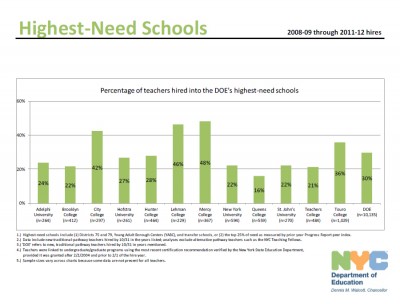Conflicting ideas about how to rate teacher prep programs
After winning a hard-fought battle against the teachers union to impose a new teacher evaluation system, New York City Mayor Michael Bloomberg has turned to evaluating the training programs that produce the city’s teachers.
The New York City Department of Education recently released what it dubs as “the nation’s first ever district level Teacher Preparation Program Reports” comparing how well a dozen of the state’s public and private institutions train teacher-candidates. But the findings are, at times, incongruous with those of national teacher preparation ratings released in June.
Those ratings, by the nonprofit advocacy group National Council on Teacher Quality, which has been a vocal critic of teacher preparation programs, were based heavily on education school curriculum and selectivity. The New York City reports focused primarily on the training program’s graduates, including measures such as the percentage of graduates who work in high-needs schools licensed in high-demand areas like science and special education and the percentage that have received tenure. It also evaluates the training programs on how well the teachers they produce scored on the city’s new evaluation system, which is based partly on standardized test scores.
Adelphi University is an example of the discrepancies between the two rating systems – and evidence of the conflict in the field over how best to judge whether teacher education programs are training teachers effectively.
Adelphi’s graduate elementary education program received one out of four stars from NCTQ. Its

